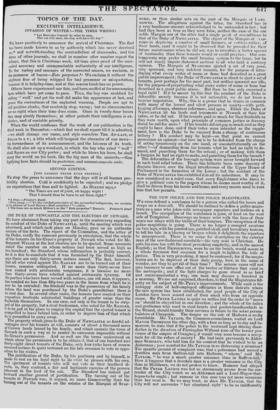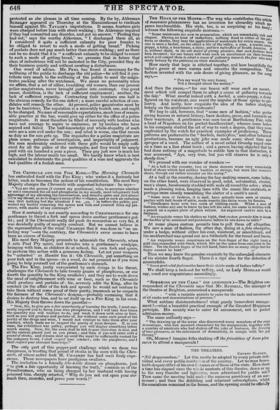THE NEW POLICE AND THE POLICE MAGISTRATES.
WE once defined a watchman to be a person who called the hours and sleeps on a door-sill. We should be inclined to define a police magis- trate as a man who jokes with newspaper reporters and reclines on a bench. The occupation of the watchmen is gone, at least on the west side of Templebar. Doorways no longer echo with the bass of their noses nor alleys with the treble of their tongues. The occupation of the police magistrate is going. There is no longer a mongrel creature on two legs, with his painted eye, patched skull, and hereditary lantern, to tell his tale in a blarney or brogue which it delighteth the reporters to misrepresent. There is no scope for description on the exterior man of the new-fashioned-constable—his very coat is Christian. He puts his case too with the most provoking simplicity, and in the merest English ; so that DEMOCRITUS, were he on the bench, would scarce in a whole forenoon find occasion for a laugh to lighten the toils of justice. This is very provoking, it must be confessed; for if the magis- trates are to be deprived of their daily gossip, how, in the name of wonder, are they to get rid of their time ? The serious cases will not give business to one office out of the twelve or thirteen that exist in the metropolis ; and if the light charges be gone about in so brief and uncircumstantial a way, one man may discuss a hundred in a morning. We are not surprised, therefore, to find the Magistrates fid- getty on the subject of Mr. PEELS improvements. While such is the unhappy state of half-employed officiaries in those districts where the new system has been established, the good people of the City of London have been scared out of their small wits from an opposite cause. Sir PETER LAURIE is quite on nettles lest the order to " move on " should be obeyed but in one direction ; and the whole of the ladies and gentlemen who used to steal hearts and pocket-handkerchiefs in the Strand, should transfer their services in future to the sober peram- bulators of Cheapside. The danger on the side of Holborn is really formidable. Mr. TAYLOR, the Common-councilman, waited on Lord MAYOR THOMPSON the other day, with a face as long as to-day and to- morrow, to state that if the police to the westward kept driving disor- derlies in the direction of Farringdon Without (one of the border pro- vinces of the empire of Cocagne), it would very soon become a recep- tacle for all the refuse of society ! He had been previously to Alder- man SCHOLEY, who told him for his comfort that he wished to be an Alderman ; poor comfort for Mr. TAYLOR in so distressing a situation ! The specific ground of complaint was, that a policeman had moved a drunken man from Saffron-hill into Holborn, " where," said Mr. TAYLOR, " he was a much greater nuisance than in Saffron-hill." How it happens that a drunken man is a greater nuisance in the City than in Middlesex, we do not profess to know. Rumour had alleged that Sir PETER LAURIE was not so strenuously averse from the sur- render of the City watch as an Alderman and a Lord-Mayor-that- hopes-to-be ought ; but rumour in this case was not more veracious than her wont is. So we may trust, as does Mr. TAYLOR, that the City will not surrender " her chartered right" to be as indifferently protected as she pleases in all time coming. By the by, Alderman Sommar appeared on Thursday at the Mansionhouse to vindicate hunseif _against Mr. TAYLOR'S imputations. It seems, fourteen girls were charged before him with street-walking ; the Alderman inquired if they had committed any disorder, and got no answer. " Finding they had not," says the worthy Alderman, " I discharged them all, as I considered it quite a sufficient calamity for poor females to be obliged to resort to such a mode of getting bread." Picking of pockets does not pay much better than street-walking ; and as there can be no doubt that it is " a sufficient calamity to be obliged to resort to such a mode of getting bread," we presume that in future that class of industrious will not be molested in the City, provided they do their business quietly and without creating a disturbance. One word of advice. Mr. PEEL has found it necessary for the wellbeing of the public to discharge the old police—he will find it con- tribute very much to the wellbeing of the public to send the magis- trates packing after the watchmen. We mean no personality when we affirm, that a set of sillier, twaddling old women, than our present police magistrates, never brought justice into contempt. One great cause, doubtless, is the lack of sufficient employment; another, the lack of sufficient capacity. Contracting their numbers one half is the obvious remedy for the one defect; a more careful selection of can- didates will remedy the other. At present, police magistrates must by law be barristers. The regulation is a miserably foolish one, and ought to be changed. No man of reasonable expectations, much less of reason- able practice at the bar, would give up either for the office of a police magistrate. It must therefore be filled of necessity with boobies who have not courage to aspire to eminence, or by boobies who have aspired and failed. The half-knowledge and whole-stupidity of such men are a sore evil under the sun ; and what is worse, one that recurs as duly as the sun gets up. The requisites for a police magistrate are plain sense, patience of investigation, and impartiality of judgment. Six men moderately endowed with these gifts would be amply suffi- cient for all the police of the metropolis, and they would be amply paid with six hundred a year a piece. Their pay just now is much too high, and the labour much too small. We hardly know which is best calculated to deteriorate the good qualities of a wise and aggravate the bad qualities of a foolish man. v.



















 Previous page
Previous page